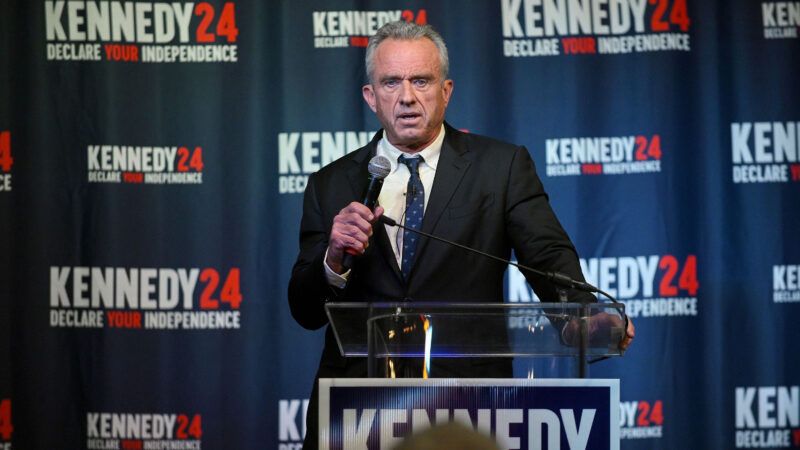RFK Jr. Spread Some Libertarian Ideas, Then Sold Out to Trump
The independent candidate deserves credit for promoting some liberty-friendly causes.

Independent candidate Robert F. Kennedy Jr. has suspended his campaign for the presidency in 10 swing states, where he will seek to remove his name from the ballot. He said on Friday that he did not want to play a spoiler role and prevent former President Donald Trump from winning the election. RFK Jr. cited his agreement with Trump on the fundamental issues of censorship and foreign policy as the reason for his tacit support.
Earlier in the week, RFK Jr.'s running mate, entrepreneur Nicole Shanahan, suggested that they wished to avoid a victory by Vice President Kamala Harris at all costs; even though RFK Jr. was formerly a Democrat—and has a recognizably Democratic last name—recent polling suggested that his candidacy was hurting Trump slightly more than Harris. RFK Jr.'s main appeal was to disaffected, contrarian voters who lost faith in the elite consensus, especially with respect to the federal government's heavy-handed COVID-19 policies; these voters are more likely to pick Trump as their second choice than Harris.
Unfortunately, the U.S.'s winner-take-all system tends to create elections that are competitive for just the two major parties. Independent and third-party candidates struggle to gain traction and end up accomplishing very little. This is a structural problem; by contrast, in a European parliamentary system, a candidate who receives just 5 percent of the national vote might expect to receive 5 percent of the representation in the government. Major parties must then work with smaller parties to form governing coalitions. In the U.S., only the winner matters.
This means that tacitly supporting one of the two major candidates in exchange for influence is actually one of the only ways for an independent to transmogrify their support base into actual power. It's not surprising, then, that RFK Jr. has chosen this path. Seeking higher office outside the two-party system is extremely difficult and Republicans and Democrats work tirelessly to make it even tougher. Democratic activists, for example, filed legal challenges to keep RFK Jr. off the ballot in New York state. While insisting that the health of democracy itself is the fundamental issue in this election, the Democratic Party hired operatives to counter third-party and independent candidates such as RFK Jr.
Often derided by the mainstream media as a conspiracy theorist for his views on vaccines, RFK Jr. attracted some libertarian support. His strident opposition to COVID-19 mandates, censorship of dissenting voices on social media, and U.S. military support for Ukraine drew positive attention from the Libertarian Party (L.P.); L.P. Chair Angela McArdle expressed optimism that his ideology was trending in a libertarian direction. Still, he continued to hold progressive views on a range of economic issues, affirmative action, and climate change.
RFK Jr. deserves credit, however, for being willing to listen to libertarians. He attended libertarian events including FreedomFest and the Libertarian National Convention; he sat for interviews with Reason's Nick Gillespie and Zach Weissmueller and appeared on my show, Rising. He also helped bring much-needed attention to the federal government's vigorous attempts at suppression of constitutionally protected speech on social media.
It's a shame that RFK Jr. was denied a spot in the first presidential debate, even though his poll numbers arguably merited inclusion. Unfortunately, both Trump and then–presumptive Democratic candidate Joe Biden agreed to exclude him, and major media organizations were perfectly willing to heed this demand.
Indeed, RFK Jr. has often been at odds with the mainstream media, federal health bureaucrats, and the leaders of both the Democratic and Republican parties (though he's friendly enough with Trump to make somewhat of an endorsement). Given such a roster of adversaries, it's no wonder many libertarians felt at least somewhat positively toward him.
However you feel about RFK, he has shined a light on a major structural problem plaguing our politics: Suppression of competition.
The two parties will keep forcing worse and worse candidates down our throats until we break this, and I applaud RFK for making the attempt. https://t.co/XmdgrL9cwk
— Zach Weissmueller (@TheAbridgedZach) August 22, 2024


Show Comments (269)